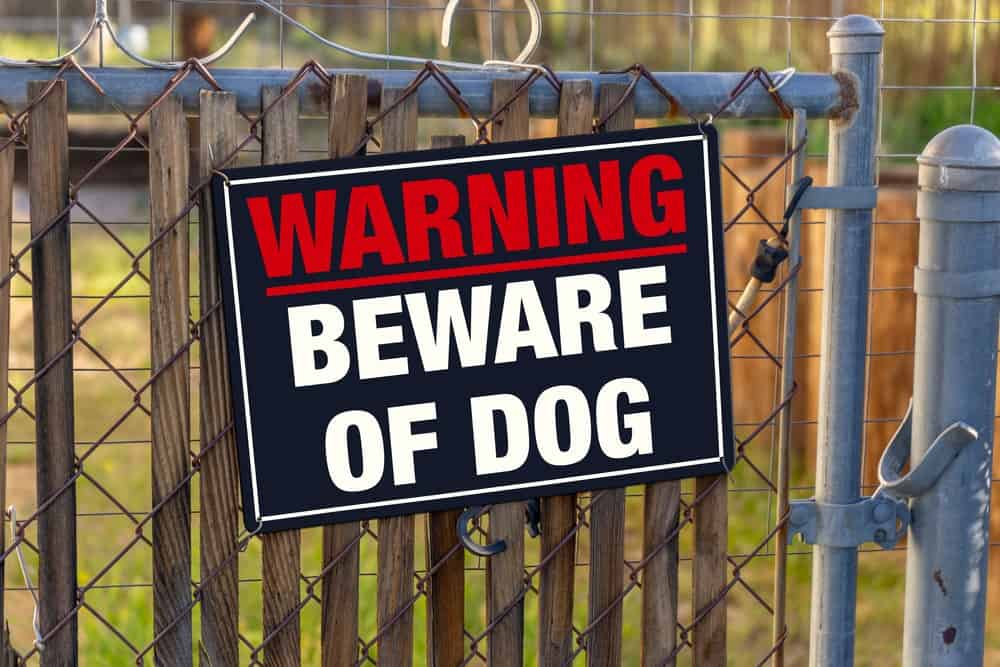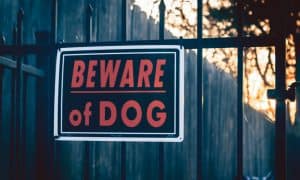“This post contains affiliate links, and I will be compensated if you make a purchase after clicking on my links.”
Generally, landowners have a right to exclude other people from their land. If someone who has not been invited onto a property enters it anyway, they become trespassers. Trespassing refers to intentionally entering into another person’s property without their consent.

If your dog bites someone on your property, the first thing you ought to do is figure out whether they were trespassing at the time of the bite. This will determine the standard of care you owe them. In some cases, alleged trespassers have implied permission to enter a property. For example, a salesperson has implied permission if your property doesn’t have a locked gate or a “no soliciting” or other warning sign.
What Standard of Care Do You Owe Trespassers?
This refers to the prudence a reasonable person should exercise during certain situations. If the homeowner fails to meet the standard of care for a particular circumstance, they may be considered negligent, meaning they may become liable for injuries to third parties.
Generally, as the property owner, you owe a lower standard of care to trespassers than you do to your invited guests. The standard of care you owe trespassers is “reasonable care.” Therefore, if you exercise reasonable care in maintaining your property, a trespasser cannot sue you after suffering dog bites.
Reasonable care refers to when an individual doesn’t unnecessarily expose other people to danger while displaying signs of any hidden dangers that the trespassers knew or ought to have known. When trying to determine whether you acted reasonably during the incident, a judge will ask what average and reasonable people would do under similar circumstances and whether you did that.
When Can a Trespasser Hold You Legally Liable?
A trespasser can hold you liable if they get injured by proving that you were negligent. Unlike other types of victims, trespassers may not use legal provisions for protection against dog bites. Instead, the law requires them to prove that your negligence caused the dog bites. There are several different situations where you are liable for any injury your dog causes.
First, you may be liable if the victims prove that you failed to prevent the incident. As a dog owner, you have a duty not to cause harm to other people. If a court determines it was foreseeable that your pet could bite another person, the risk is deemed unreasonable.

If you fail to do this and your negligence results in dog bites, a trespasser can sue you.
Another situation where you may be held liable for such incidents is if you ignore your pet’s violent propensities. A trespasser can also sue you if you knew or should have known that your dog was dangerous.
A victim can only prove that you knew about the pet’s violent nature by showing that it has bitten another person before. Additionally, trespassers have to prove that your dog’s dangerous nature was a significant factor in the injuries.
In some states and jurisdictions, if you keep a dog that is known to be dangerous, the court will impose strict liability. You can visit this link for more information about situations when dog owners are liable for injuries caused by their pets.
Can You Claim the Trespasser Was Partially at Fault?
In the event of dog bite claims, one of the most common defenses for dog owners is claiming a trespasser was partially at fault. In some areas, the comparative fault rule is applied. This involves reducing the settlement they can recover by the percentage of their fault.
If your pet bites a trespasser, the first thing you’ll need to do is consult an attorney to learn more about your rights and the laws in your state. A lawyer may be able to save you money in a lawsuit or even save your dog’s life, and they can also make a case for the trespasser’s liability.
About the Author: Cheryl Roy
While she has a solid education in law, Cheryl Roy wanted more than a job as a lawyer. She knew that people needed information and a better understanding of everyday legal matters. She began writing articles and guidelines to educate individuals and businesses. Now, she is collaborating with blogs, magazines, and outlets, being proud that her knowledge and her writing talent are helping everyone every day.


















